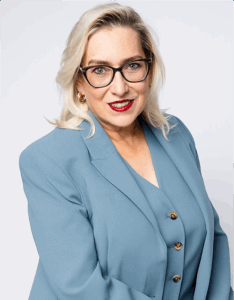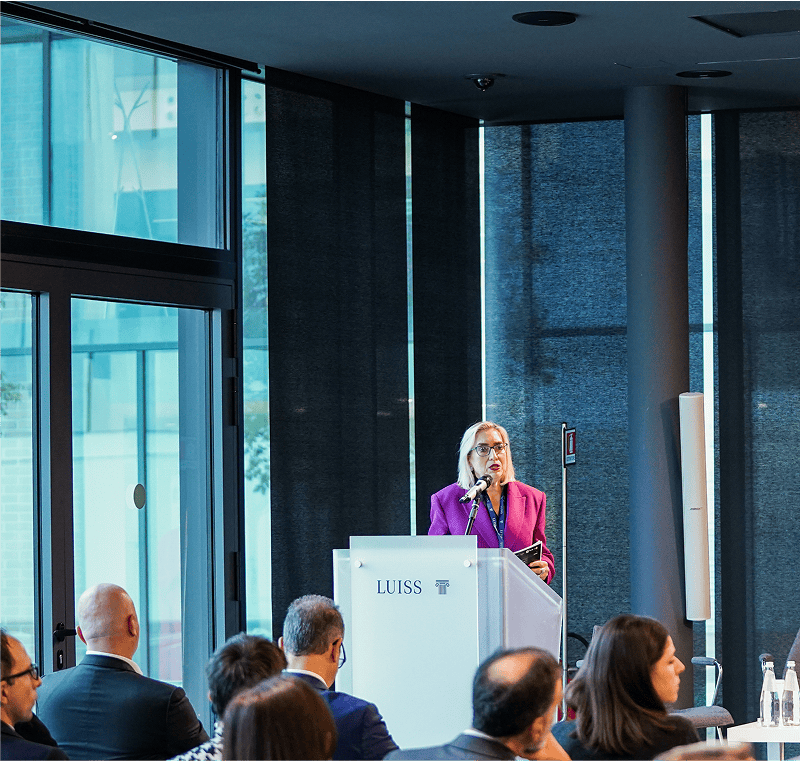Claudia Segre, Founder and President of Global Thinking Foundation ETS: Economic Knowledge as a driver of Social Equality, Sustainability, and Fair Legislation.
By Maurice Abbati.
BIOGRAPHY

With many years of experience in big Italian Banking Groups, Claudia Segre specialised in Global Geopolitical Dynamics and International Relations in the context of the International Monetary Fund (IMF) and the Organisation for Security and Co-operation in Europe (OCSE). Since 1997, she has been concerned with Womenomics and Gender Advocacy.
Consequently, she has held prestigious roles as: President and Founder of the Global Thinking Foundation ETS and Global Thinking France Association; Co-Chair at Women 7 (G7); Co-Founder and Member of the Board of Directors and Presidency at ASSIOMFOREX (Italian leading financial association); Vice-President at AssoFintech (prior Italian hub on Fintech and Insurtech); Honorary Member at ACI FOREX International; Member of the Scientific Technical Committee at the National Observatory on violence against women and domestic violence within the Equal Opportunities and Family Department at the Presidency of the Italian Council of Ministers; already a Member of the Advisory Board of the Sixth Finance Committee at the Italian Chamber of Deputies and the Board of Directors within the 2021-2023 Sustainable Finance Forum.
From 1986 to 2017, she was in charge as an Executive Director and Bank Financial Head in various paramount Banking Groups, notably Credem, Unicredit and Intesa San Paolo. She has been lecturing on Geopolitics and Islamic Finance and, from 2012 to 2015, she was Chairman at the Board of Education of ACI International. She was awarded many prizes and honours among them the most popular 2019 Forbes Top 100 Italian Women.
Furthermore, she is the author of various articles about Economics and Finance, cooperating with different media such as First on Line and Wall Street Italia. She is considered an expert in the field of Geopolitics and International Dynamics, enjoying a wide reputation in Italy and abroad. Not by chance, she was mentioned in the following broadcastings: CFN, CNBC, RAI TG1, RAI3, Radio Sole24Ore, RaiNews, Sky TV, Radio Sole24Ore).
MONACŒCOART® had the privilege of interviewing exclusively Claudia Segre on the latest trends concerning ESG (Environmental, Social, Governance) strategies and Sustainable Finance.
🎙INTERVIEW
MONACŒCOART®: What inspired the creation of your Foundation, what are the primary objectives and whom is addressed to?
🗣️ Claudia Segre : The Foundation was launched in 2016, just after the ratification of the 2030 Agenda on the Sustainable Development Goals, in the footsteps of the Millennial Goals. With over 35 years’ experience in international finance, working within the International Monetary Fund chaired by Christine Lagarde, particularly sensitive to women’s financial inclusion in emerging countries, I focused on Womenomics. This new approach was born in Japan in the 90s to develop women’s policies able to raise awareness of economic aspects. From all that, I conceived a long-term philanthropic contribution to tackle socio-economic aspects in cooperation with major field institutions, notably the OECD (Organisation for Economic Cooperation and Development) and a network of leading banking groups.
Closely with George Washington University we then designed two scholarships aimed at evaluating how financial education has a cross-cutting impact, regardless of socio-demographic background, while encouraging the evolution of self-determination, with special regard to women and girls. The Global Thinking Foundation ETS stems from these premises setting the unique target to prevent any economic violence and abuse through the dissemination of digital and financial education. We locate it in Italy for its backward gender equality position compared to other OECD countries. A situation that contributes to social fragility in the course of citizens’ lives. Working in France and Belgium at the same time allows us to compare various regulations and implement best solutions and practices to be applied in each country. On the contrary, the American liaison ended after covid pandemics for the change in their national approach making it more difficult to interact with citizens.

MONACŒCOART®: You have recently stated: “financial education is a real income of economic freedom” as well as an asset to promote gender equality. What do you mean?
🗣️ Claudia Segre : In my view, the lack of a basic financial education from school age may put economic independence at risk of every citizen. This economic and financial knowledge is essential to give a turn to your life in the development of the vocational and social path, following up the school training. As a matter of fact, the lack of these bases isolates individuals from job opportunities, preventing them to participate to community and family opportunities.

MONACŒCOART®: What does “being sustainable” mean in the business and finance sector?
🗣️ Claudia Segre : “Sustainability” and its implementation through the UN 2030 Agenda, as well as “inclusion” have already become common knowledge. According to my personal experience with university students, these concepts are considered as basic standards and pillars that need no explanation. This is a great achievement, and we can now work on the next steps. However, the value of sustainability is not fully understood yet by companies and individual workers. This is a huge effort, and we are committed to encourage virtuous behaviours able to avoid environmental and social troubles, due to the scarcity of resources.

MONACŒCOART®: An increasing number of Italian and European companies are investing in ESG (Environment, Social and Governance factors) strategy. According to your multi-year experience, do you consider this trend as a natural consequence of the more stringent European legal framework or as the result of a spontaneous evolution of global Economy?
🗣️ Claudia Segre : I have noticed a greater awareness on ESG factors, especially about environmental issues, while working with companies and workers. This is the result of an authentic attitude aimed at increasing company’s reputation towards suppliers and customers besides improving their products in terms of sustainability and energy efficiency. Even if you just focus on profit, the well-being of employees cannot be ignored. At the same time, regulations are necessary to rule non-financial reporting on due diligence, that is on the value of the supply chain as a whole.
These strategies have already achieved a domino effect for companies, notwithstanding bigger or smaller, to consider their pollution impact. Recent studies by GSMI (Global Standards Mapping Initiative) and further analyses show that two thirds of European consumers want to find environmental and social aspects as well as leading corporate standards. An increased number of workers (up to 50% in emerging countries compared to 30-40% in Europe) are willing to work less under higher welfare conditions, like the American trend shows. Social aspects and employment rights are in the spotlight to fight against the lack of insurance or social security coverage. I keep a positive feeling about it.
The regulatory framework and best practices, in company’s quality and gender certified management, are encouraging progress at international level to counterbalance some boomers who think that anti-pollution measures are a nonsense, considering that other geographical areas pollute in an unconditional way, based on a widespread misbelief. Unlike this misleading ideological stance, Middle East and China are strongly committed in investing and putting in place sustainable policies. Green themes have become so crucial that they are currently influencing the US Presidential election campaign. Fracking (note: the extraction process which combines chemicals with large amounts of water and sand at high pressure to extract fossil fuels) is a widely debated topic between the two main candidates.

MONACŒCOART®: Environment, Social Aspects and Governance are the three pillars of this new holistic and multi-stakeholder vision strongly linked to the very concept of Sustainable Development, do you think that one should prevail over the others? If so, which one and why? Otherwise, could you tell us what is essential for each of them?
🗣️ Claudia Segre : When we (Consumers) are seeking for a telephone operator, our biggest concern is safeguarding privacy as for data management. In other words, we want to benefit from the highest level of cyber security by considering the corresponding socio-economic implications.
When we talk about companies, environmental aspects prevail since the Planet crisis is increasingly tangible, despite higher costs to bear to face it. New generations are particularly aware of it, also in choosing financial services related to ESG, Green or Social Bonds. Moreover, without governance you go nowhere. Therefore, the regulatory framework allows companies to develop properly also through targeted sanctions. The three pillars are then crucial on the same level. Their balance is the key, and this is seen even more in the current international crisis situation.

MONACŒCOART®: What are the limits to environmental investment within a company or a start-up?
🗣️ Claudia Segre : Artificial Intelligence (A.I.) environmental impact is a critical point, definitely. Based on my personal experience, environmental criteria are more and more considered as an essential requirement. Nevertheless, talking about Fintech or Blockchain startups, the 2030 Agenda goals are hardly measurable. How can we calculate the ecological footprint? This matter cannot be underestimated, provided that each sector has its own rankings and benchmarks. At my Foundation, any project is submitted for a few years to ad-hoc social impact assessment, including the ROI (Return on Investment) factor which gives a qualitative value on a non-profit investment. In short, we must always be aware of the variable “environment”.

MONACŒCOART®: Did ESG strategy influenced your way of operating in international finance?
🗣️ Claudia Segre: Yes, it did. In private banking, I realised that moving from operating finance to the so called ‘affluent’ customer finance, there was the need to develop internationalization in order to implement creditworthiness. In my experience at the UNICREDIT group, where I was dealing with rating system and credit assessment of banks and countries with international value, I found out deep differences among various countries. Thus, adapting credit measures to local emerging business realities is prior, regardless of their size, also with reference to startup post-incubation and acceleration stage.
My Foundation takes care of organising mentorship and reverse mentorship projects on sustainability and credit efficiency with the involvement of volunteers to join entrepreneurs and under-35. That was fundamental to fight against discrimination against women entrepreneurs and put it on the spotlight to bypass an outdated opinion. We are working in close cooperation with Confindustria (General Confederation of Italian Industry) and Confcommercio (Italian General Confederation of Enterprises) at national level to explain the different forms of funding, including public, state – controlled or private incentives for women entrepreneurs. Recently, I have started to debate about FemTech in partnership with AssoFintech, that is the application of healthcare and longevity anti-aging treatments.

MONACŒCOART®: What is next as for ESG strategies? Are you developing new projects in this regard?
🗣️ Claudia Segre: I believe that financial products and proposals need to be made available to all and widely understood. Six years ago, we launched Empower Your Life, a think tank to spread financial education to everyone, not only to fund holders. In the meanwhile, the Fintech Observatory for sustainability involves major players from both the institutional and private sectors to work together on investment impact or on the liaison between the philanthropic and ethical job aspects and possible solutions addressed to each of us. The recent inclusion of Sustainability in the European Union MIFID (Markets in Financial Instruments Directive) directive represents a new challenge for the banking sector and for financial consultants who need specific training in the field. We are also developing a debate on social impacts of influencers and the risk of online ludomania with the help of Assoinfluencer, main Italian influencer association.
Last but not least, we are preparing the second step of a new digital open-source platform, named Wefor addressed to all those who share investing impact as a cornerstone for Italian philanthropy operating in the Tertiary Sector, in synergy with institutions and individuals. The platform is subdivided into various sections: education, the skills; empowerment, the implementation of these skills; engagement, social participation of people in community projects; equality, fighting for the rights of all. Sustainable Finance for children will be integral part of it to raise awareness of “being sustainable” and to collect their proposals. We hope that the Italian and other European governments will support initiatives like these ones to evolve ESG approach. ***











